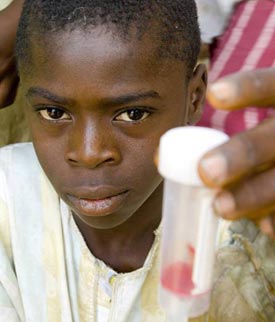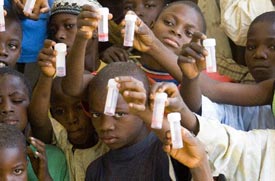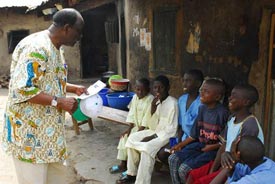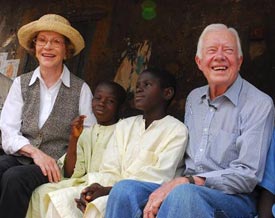The Carter Center Health and Peace Programs appreciate the continued support of our foundation, government, and corporate donors and are pleased to highlight their contributions in these regular Web features.

Featured December 2010
The Carter Center is honored to receive the continued generosity of the Izumi Foundation in expanding the Schistosomiasis Control Program in Nigeria. Founded in 1998 by the lay Buddhist order Shinnyo-en and based in Boston, Mass., the Izumi Foundation puts the Shinnyo-en value of altruism into practice by supporting health programs in developing countries worldwide. To date, the Izumi Foundation has supported 49 health projects in 25 countries.
The Izumi Foundation recently awarded a new grant to The Carter Center: $388,179 to support expansion of the Schistosomiasis Control Program in Delta and Edo states of Nigeria from 2010 through 2013. This grant is an extension of previous support from the Izumi Foundation for schistosomiasis control in Plateau, Delta, and Nasarawa states. From 2006-2008, thanks in large part to the Izumi Foundation and medicine provided from the World Health Organization, the Schistosomiasis Control Program provided a total of 1,260,287 treatments in Plateau and Nasarawa states and 191,007 in Delta state.
Schistosomiasis is a preventable parasitic disease that disproportionately affects children. An estimated 200 million people in 74 countries are infected, with 100 million in Africa alone. Individuals become infected when they come into contact with water containing the parasite through everyday activities such as swimming, bathing, drinking, or washing laundry. The parasite enters a person's body through the skin, matures, and breeds, releasing sharp eggs which can tear organ tissues. Symptoms and effects of schistosomiasis include bloody urine, anemia, poor growth and development, kidney and liver disease, and premature death.
Treatment of schistosomiasis includes a single annual dose of praziquantel. Izumi Foundation funds will support disease mapping in Edo state, and the delivery of mass annual treatments of praziquantel and community health education in affected areas of both Delta and Edo states.
According to the Izumi Foundation, "The foundation's logo is designed to suggest a wellspring, a sustaining source of life. The image is also a reminder of the everlastingly compassionate heart of the Buddha." The Izumi Foundation's commitment to improving the health of disadvantaged people is true to its mission of compassion. In addition, its support in providing medical treatment gives countless people hope that for their communities, water will indeed be a "sustaining source of life," not a source of schistosomiasis.
Please sign up below for important news about the work of The Carter Center and special event invitations.

Browse our archive of Carter Center featured partners »

All photos: Carter Center
A Nigerian boy holds a vial containing his bloody urine, an effect of schistosomiasis. The greatness of the pain leads many children to stop attending school.
 A group of Nigerian boys hold vials of their urine bloodied by schistosomiasis, which they contracted by swimming in a local river. School-age children are most likely to be affected by the disease. The Carter Center's Schistosomiasis Control Program is working to lower the high rate of children in affected areas who contract the disease, nearly one in five.
A group of Nigerian boys hold vials of their urine bloodied by schistosomiasis, which they contracted by swimming in a local river. School-age children are most likely to be affected by the disease. The Carter Center's Schistosomiasis Control Program is working to lower the high rate of children in affected areas who contract the disease, nearly one in five.
 A health educator teaches young Nigerian boys about schistosomiasis. Left untreated, the disease can cause stunted growth and cognitive development, and sometimes premature death.
A health educator teaches young Nigerian boys about schistosomiasis. Left untreated, the disease can cause stunted growth and cognitive development, and sometimes premature death. In 2007, former U.S. President Jimmy Carter and former First Lady Rosalynn Carter visited endemic villages in Nigeria. While there, they witnessed directly the hope that simple medical treatments bring to affected communities.
In 2007, former U.S. President Jimmy Carter and former First Lady Rosalynn Carter visited endemic villages in Nigeria. While there, they witnessed directly the hope that simple medical treatments bring to affected communities.